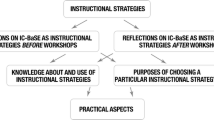Abstract
The PATHWAY framework provides to teachers a concise methodology for designing, expressing and representing inquiry-based educational practices. This allows, first, monitoring the identified activities for teaching science by inquiry, that is, providing different scenarios which are identified as subject-domain independent “educational activities” that implement a specific inquiry educational approach; second, to properly implement existing Best Practice Educational Scenarios from international success stories; third, to establish new activities for teaching science by inquiry. All these activities follow three main categories: school-based activities, collaboration between schools and informal science centres or museums as well as collaboration even with research centres. Altogether, PATHWAY up to now has trained 10.053 teachers by using the provided best practices in real school environments and providing the portal’s materials appropriate for classroom use.
Access this chapter
Tax calculation will be finalised at checkout
Purchases are for personal use only
Similar content being viewed by others
References
Asay, L. D., & Orgill, M. K. (2010). Analysis of essential features of inquiry found in articles published in the science teacher, 1998–2007. Journal of Science Teacher Education, 21, 57–79.
Beetham, H. (2007). An approach to learning design. In H. Beetham & R. Sharpe (Eds.), Re-thinking pedagogy for a digital age (pp. 26–39). New York: Routledge.
Biggs, J. (1996). Enhancing teaching through constructive alignment. Higher Education, 32, 347–364.
Bogner, F. X., Boudalis, A. K., & Sotiriou, S. (2013). Best practices of inquiry-based science education. Methods and activities. Athens: Epinoia.
Bybee, R. W. (2000). Teaching science as inquiry. In E. H. van Zee (Ed.), Inquiring into inquiry learning and teaching science (pp. 20–46). Washington, DC: AAAS.
Bybee, R. W., Trowbridge, L. W., & Powell, J. C. (2008). Teaching secondary school science: Strategies for developing scientific literacy (9th ed.). Columbus: Pearson/Merrill/Prentice Hall.
Conole, G. (2008). Using compendium as a tool to support the design of learning activities. In A. Okada, S. B. Shum, & T. Sherbone (Eds.), Knowledge cartography: Software tools and mapping techniques (pp. 199–221). London: Springer.
Conradty, C., & Bogner, F. X. (2011). Computer-aided learning: Unguided versus guided instruction. ASL (Advanced Science Letters), 4(11/12), 3310–3316.
Crawford, B. A. (2000). Embracing the essence of inquiry: New roles for science teachers. Journal of Research in Science Teaching, 37(9), 916–937.
Ellis, E., & Goodyear, P. (2010). Students’ experiences of e-learning in higher education: The ecology of sustainable innovation. Oxon: Routledge.
Franke, G., & Bogner, F. X. (2011). Conceptual change in students’ molecular biology education: Tilting at windmills? Journal of Educational Research, 104, 1–14.
Falconer, I., Beetham, H., Oliver, R., Lockyer, L., & Littlejohn, A. (2007). Mod4L final report: Representing learning designs. Retrieved 14 May, 2014, from http://www.academy.gcal.ac.uk/mod4l/
Girwidz, R., Bogner, F. X., Rubitzko, T., & Schaal, S. (2006). Media-assisted learning in science education: An interdisciplinary approach to hibernation and energy transfer. Science Education International, 17(2), 95–107.
McLean, P., & Scott, B. (2011). Competencies for learning design: A review of the literature and a proposed framework. British Journal of Educational Technology, 42(4), 557–572.
Moskovitz, C., & Kellogg, D. (2009). Inquiry-based writing in the laboratory course. Science, 332(6032), 919–920. doi:10.1126/science.1200353.
Pöhnl, S., & Bogner, F. X. (2012). Learning with computer-based multimedia: Gender effects on efficiency. Journal of Educational Computing Research, 47(4), 387–407.
Randler, C., & Bogner, F. X. (2009). Efficacy of two different instructional methods involving complex ecological content. International Journal of Science and Mathematics Education, 7, 315–337.
Scharfenberg, F.-J., & Bogner, F. X. (2010). Instructional efficiency of changing cognitive load in out-of-school laboratories. International Journal of Science Education, 32(6), 829–844.
Scharfenberg, F.-J., & Bogner, F. X. (2011). A new two-step approach for hands-on teaching of gene technology: Effects on students’ activities during experimentation in an outreach gene technology lab. Research in Science Education, 41(4), 505–523.
Sotiriou, S., & Bogner, F. X. (2005). The pathway to high quality science teaching. Athens: Epinoia.
Sotiriou, S., & Bogner, F. X. (2011). Inspiring science learning: Designing the science classroom of the future. ASL (Advanced Science Letters), 4, 3304–3309.
Sotiriou, S., Bogner, F. X., & Neofotistos, G. (2011). Quantitative analysis of the usage of the COSMOS science education portal. Journal of Science and Technology Education, 20, 333–346.
Author information
Authors and Affiliations
Corresponding author
Editor information
Editors and Affiliations
Rights and permissions
Copyright information
© 2016 Springer International Publishing Switzerland
About this chapter
Cite this chapter
Sotiriou, S., Gras-Velázque, A., Bogner, F.X. (2016). The PATHWAY to Inquiry-Based Teaching – European Perspective to Shift Science Classroom Realities. In: Riopel, M., Smyrnaiou, Z. (eds) New Developments in Science and Technology Education. Innovations in Science Education and Technology, vol 23. Springer, Cham. https://doi.org/10.1007/978-3-319-22933-1_16
Download citation
DOI: https://doi.org/10.1007/978-3-319-22933-1_16
Published:
Publisher Name: Springer, Cham
Print ISBN: 978-3-319-22932-4
Online ISBN: 978-3-319-22933-1
eBook Packages: EducationEducation (R0)




